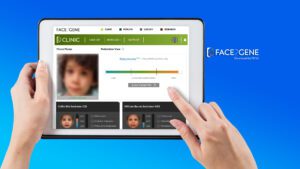
Fetal Fentanyl Syndrome: Unveiling a New Syndrome Linked to Fentanyl Use During Pregnancy
Dr. Karen Gripp, MD, Chief of the Division of Medical Genetics at Nemours Children’s Health in Wilmington, has been at…
October 3, 2017
“FDNA uses artificial intelligence to transform big data into actionable genomic intelligence to improve diagnostics and therapeutics in the rare disease space. With the world’s largest network of clinicians, labs, and researchers specializing in genetics, we are creating the most comprehensive genomic database to support our mission.”
The article describes how eHealth startup FDNA has introduced Next-Generation Phenotyping (NGP), a cutting-edge technology designed to revolutionize the expedite the diagnosis of genetic disorders. The NGP platform leverages artificial intelligence and deep learning to analyze phenotypic data, significantly enhancing the accuracy and speed of rare disease identification. It integrates facial recognition via the Face2Gene app, which examines facial features to detect potential genetic conditions. This innovative decision support tool allows for a more precise phenotyping process, helping clinicians identify rare diseases with greater confidence. FDNA’s NGP aims to set a new standard in the field, providing critical support for healthcare professionals and improving patient outcomes.

Dr. Karen Gripp, MD, Chief of the Division of Medical Genetics at Nemours Children’s Health in Wilmington, has been at…

Dr Giulia Pascolini, an esteemed Italian M.D. and Ph.D., is currently responsible for the Genetic Counselling Service of the Istituto…

Founded in 2017, the Spanish Coffin Siris Syndrome Association is an organization dedicated to supporting families affected by this rare…